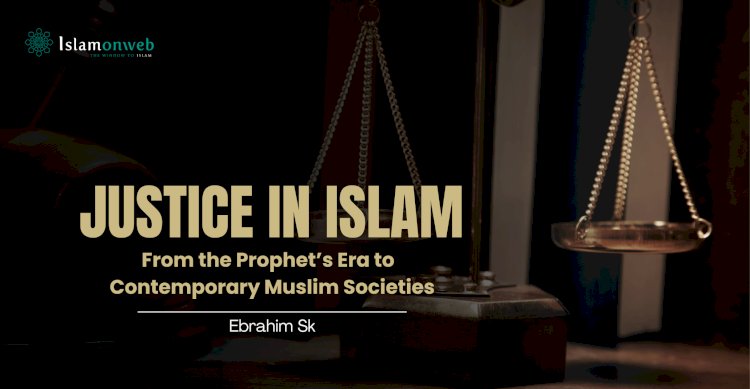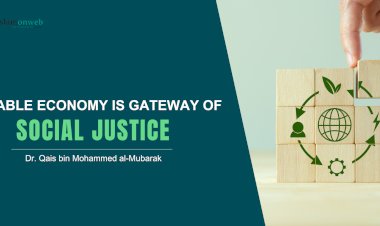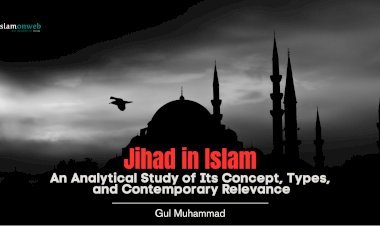Justice in Islam: From the Prophet’s Era to Contemporary Muslim Societies
At the heart of the Islamic moral and legal vision lies ʿAdl (justice) and Qisṭ (equity). The Qurʾān repeatedly commands uprightness, fairness in judgment, and the safeguarding of rights, while the Prophetic Sunnah and early Muslim governance sought to internalize these principles within communal life.
The Qurʾān declares: “O you who believe! Stand out firmly for justice, as witnesses to Allah, even though it be against yourselves” (Sūrat al-Nisāʾ, 4:135).
Throughout Muslim history, the discourse on justice has evolved dynamically—doctrinally through fiqh and uṣūl al-fiqh, institutionally through the khilāfah, awqāf, and qaḍāʾ, and morally through taṣawwuf and theological ethics. In the modern era, Muslims face new intellectual and practical challenges—ranging from economic inequality and weak institutions to global capitalism, identity politics, and state dysfunction.
This essay traces the genealogy of the Islamic concept of justice from the Prophetic era, examines its articulation in classical Islamic thought, and explores how these enduring principles can be pragmatically applied to address contemporary issues of inequality and social injustice.
Foundational Texts and Normative Principles
The foundation of justice in Islam lies primarily in the divine revelation. The Qurʾān repeatedly commands believers to uphold justice, even when it conflicts with personal interests:
“O you who believe! Stand out firmly for justice, as witnesses to Allah, even though it be against yourselves…” (Sūrat al-Nisāʾ, 4:135).
It further declares: “Indeed, Allah commands you to render trusts to whom they are due, and when you judge between people, judge with justice.” (Sūrat al-Nisāʾ, 4:58).
Such verses, along with others (e.g., Sūrat al-Māʾidah, 5:8), establish justice as both a private moral duty and a public-political responsibility.
The Prophet ﷺ embodied these principles in his judgments and conduct. His decisions consistently reflected fairness without bias towards any party—be it in matters involving non-Muslim subjects or disputes among tribes—and his actions safeguarded fundamental rights related to property, family, and human dignity.
Prophetic traditions also emphasise the virtue of justice and condemn oppression. The Prophet ﷺ said: “The just will be seated upon pulpits of light.” (Ṣaḥīḥ Muslim, 1827).
Two key features distinguish the Islamic conception of justice. First, it is both procedural and distributive—it demands impartial processes (fair adjudication and credible testimony) and equitable outcomes that protect the weak and vulnerable. Second, justice in Islam is teleological, serving the higher objectives (maqāṣid) of the Sharīʿah: the preservation of religion, life, intellect, lineage, and property. Hence, justice is not a mere legal formality but a means to realise these divine purposes.
Classic Formulations and Institutional Mechanisms
Among classical jurists and political thinkers, justice was articulated within a comprehensive legal and administrative framework. In fiqh, ʿadl served as a moral–legal principle governing judicial competence in matters such as testimony, guardianship, and leadership. In uṣūl al-fiqh, justice was seen as one of the higher objectives (maqāṣid) of the Sharīʿah. Al-Shāṭibī stated: “The Sharīʿah aims to secure the welfare of the people, and justice is the cornerstone of this welfare.” (al-Shāṭibī, 2002).
This principle was further affirmed in political theory. In al-Aḥkām al-Sulṭāniyyah, al-Māwardī emphasised that political authority is legitimate only when it ensures public order and protects rights—essentially, when it establishes justice: “The legitimacy of authority is contingent upon the establishment of justice, for it is the foundation of public order.” (al-Māwardī, 1996).
Institutionally, this ideal found expression in the qāḍī (judicial) and maẓālim (grievance) systems, which offered formal recourse against injustice. The waqf (endowment) system functioned as a social safety net, redistributing wealth and sustaining public goods such as education and healthcare.
Through these mechanisms, Islamic scholarship cultivated a normative culture that combined ethical exhortation (akhlāq), Sufi moral refinement, and juridical discipline, fostering a civic ethos grounded in fairness and compassion.
Nevertheless, classical societies were not free from hierarchies and injustices. Social stratification and patrimonial authority at times undermined the equitable ideals of justice, revealing the persistent tension between ethical principles and political realities.
Modernity, Colonialism, and New Configurations of Justice
From the nineteenth century onward, modern state structures, capitalist markets, colonial legal reforms, and national projects began reshaping the institutional contexts of justice in Muslim societies. Colonial administrations disrupted traditional adjudicatory systems, selectively codified laws, and privileged market relations—thereby deepening social inequalities.
In India, under British colonial rule, traditional Islamic judicial systems, including qāḍī courts, were marginalised in favour of a colonial legal framework that largely disregarded Islamic principles of justice. Following independence, most postcolonial states inherited hybrid legal systems that centralised authority, weakening both independent adjudication and the capacity for meaningful redistribution.
Intellectually, Muslim responses varied. Some scholars sought to reinterpret and adapt Sharīʿah to modern institutions, while others viewed Islamic justice as a means of resistance against colonial and capitalist domination. Modernist jurists, in turn, attempted to find common ground between Islamic ethical principles and international human rights frameworks.
In recent times, welfare-oriented approaches—such as the institutionalisation of zakāt, the modernisation of awqāf, and the rise of redistributive discourse among Islamic movements—demonstrate that justice remains an enduring and mobilising ideal within Muslim thought and activism.
Current Challenges: Inequalities and Social Injustice
Today, Muslim societies face numerous challenges—economic stratification, gender discrimination, sectarianism, political exclusion, weak rule of law, corruption, clientelism, and external pressures. Yet, these difficulties also open opportunities for reform guided by Islamic principles.
The Qurʾān commands: “O you who believe! Stand out firmly for justice, as witnesses to Allah, even though it be against yourselves” (Sūrat al-Nisāʾ, 4:135). This divine injunction remains a moral compass for addressing contemporary inequities.
In Malaysia, for example, the National Zakat Board has reformed zakāt distribution to ensure better welfare for the poor and marginalised. Upholding equality before the law through independent judiciaries and transparent legal procedures reflects Qurʾānic directives for fairness and truthful testimony.
Islamic civilisation offers several institutional solutions for structural poverty and inequality—zakāt, ṣadaqah, waqf, and state taxation. Strengthening these tools through transparent administration, revitalising awqāf for education and healthcare, and establishing equitable tax systems can help reduce wealth disparities.
The maqāṣid al-sharīʿah framework—centred on human dignity, welfare, and justice—can guide contemporary policies on universal access to education, healthcare, and fair labour rights. Reform efforts that aim to improve women’s status by eliminating discriminatory laws and customs are likewise in harmony with Qurʾānic justice.
Moreover, Islam’s prohibition of betraying trusts (amānah) provides a strong moral basis for anti-corruption initiatives rooted in civic participation and transparency. The historical Islamic model of governance, with its emphasis on accountability and pluralism, offers valuable lessons for developing constitutional safeguards, legal protections, and civic frameworks that counter sectarianism and foster social harmony.
Just Implementation of Recommendations
To translate Islamic ideals of justice into effective modern institutions, a convergence of strategies is essential.
First, constitutional safeguards should be reinforced through independent appellate review, ensuring the protection of rights and allowing space for legal pluralism—particularly in areas such as Islamic family and inheritance law.
Second, zakāt and waqf must be institutionalised as transparent, publicly accountable mechanisms to fund education, healthcare, and social welfare. Independent auditing systems and participatory governance would strengthen public trust and ensure equitable distribution.
Embedding the maqāṣid al-sharīʿah framework into policymaking is equally vital. This requires multi-disciplinary councils comprising scholars, economists, and civil society representatives to assess legislation according to Sharīʿah objectives—especially those relating to distributive justice and human welfare.
Judicial reform should prioritise ethical training, procedural transparency, digitisation of court records, and merit-based appointments to reduce bias and enhance accessibility to justice.
Addressing economic inequality calls for ethical microfinance, progressive taxation, targeted land reforms, and robust enforcement of labour rights.
Finally, sustained civic education and religious literacy programmes are crucial to embedding justice as a core Islamic value. Such efforts can nurture civic virtue, informed public discourse, and resilience against clientelism and sectarian manipulation—thereby realising the Qurʾānic vision of a just and upright society.
Theoretical Synthesis: Justice as Procedure, Outcome, and Virtue
Islamic justice must operate across three complementary dimensions. Procedurally, it requires institutions grounded in impartiality and norms of transparency. Distributively, it demands equitable outcomes and social safety nets that protect the vulnerable. Ethically, it cultivates virtues such as compassion, humility, and responsibility—ensuring that justice endures beyond the law’s coercive mechanisms. Legal reform without moral renewal remains hollow, while moral exhortation without institutional support proves ineffective.
Conclusion
Justice in Islam is not a static legal formula but a living, teleological mandate. The maqāṣid al-sharīʿah framework—prioritising human dignity, welfare, and justice—can guide modern policies to address poverty, inequality, and gender discrimination. It shaped the early Muslim polity, inspired classical jurisprudence, and now holds the potential to meet contemporary challenges of social injustice.
The Qurʾānic injunctions and Prophetic practice provide enduring normative standards; classical institutions such as qaḍāʾ, waqf, and jurisprudence offer organisational lessons; and modern policy tools, guided by maqāṣid-based reasoning and safeguarded institutions, can translate ethical imperatives into tangible social outcomes.
For contemporary Muslim societies, the challenge is both intellectual and political: to reinterpret and institutionalise Islamic principles of justice so as to build inclusive structures, uphold human dignity, and restore public trust in an era of rapid socio-economic transformation.
About the Author:
Ebrahim Sk, Pakur, Jharkhand. First-Year Degree Student, Department of Islamic Jurisprudence, Darul Huda Islamic University, Bengal Campus.
References:
- Abou El Fadl, Khaled. The Search for Beauty in Islam: A Conference of the Books. Oxford University Press, 2006.
- Auda, Jasser. Maqasid al-Shariah as Philosophy of Islamic Law: A Systems Approach. The International Institute of Islamic Thought, 2008.
- Hallaq, Wael B. Sharīʿa: Theory, Practice, Transformations. Cambridge University Press, 2009.
- al-Mawardi, Abu al-Hasan. Al-Aḥkām al-Sulṭāniyya (The Ordinances of Government). Translated by Wafaa H. Wahba, Routledge, 1996.
- al-Shāṭibī, Ibn. Al-Muwafaqāt fi Usul al-Sharia (The Reconciliation of the Foundations of Islamic Law). Edited by M.A. al-Bukhari. Beirut: Dar al-Kutub al-Ilmiyya, 2002.
- Al-Bukhari, Muhammad ibn Ismail. Sahih al-Bukhari. Translated by M. Muhsin Khan. Al-Maktaba al-Islami, 1979.
- Muslim, Abu al-Husayn. Sahih Muslim. Translated by Abdul Hamid Siddiqi. Kitab Bhavan, 1991.
Disclaimer
The views expressed in this article are the author’s own and do not necessarily mirror Islamonweb’s editorial stance.
























Leave A Comment